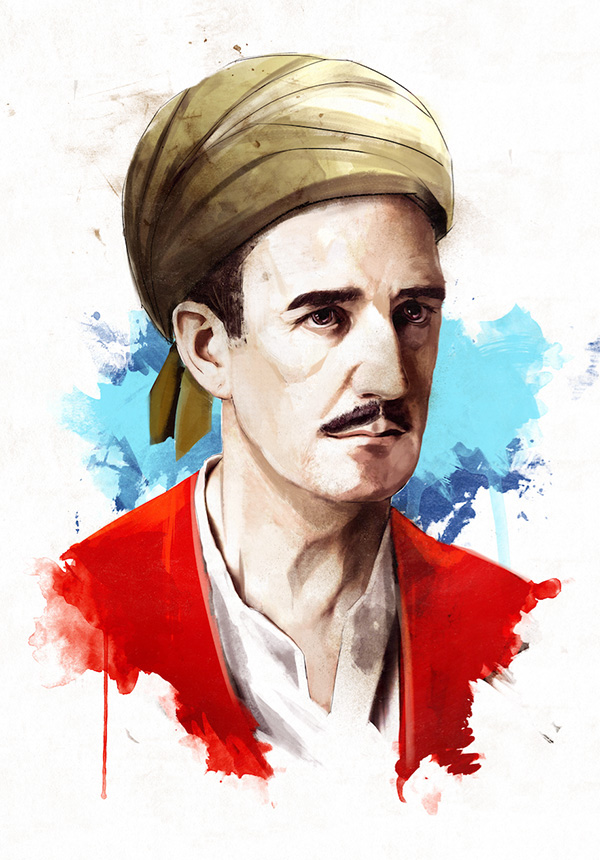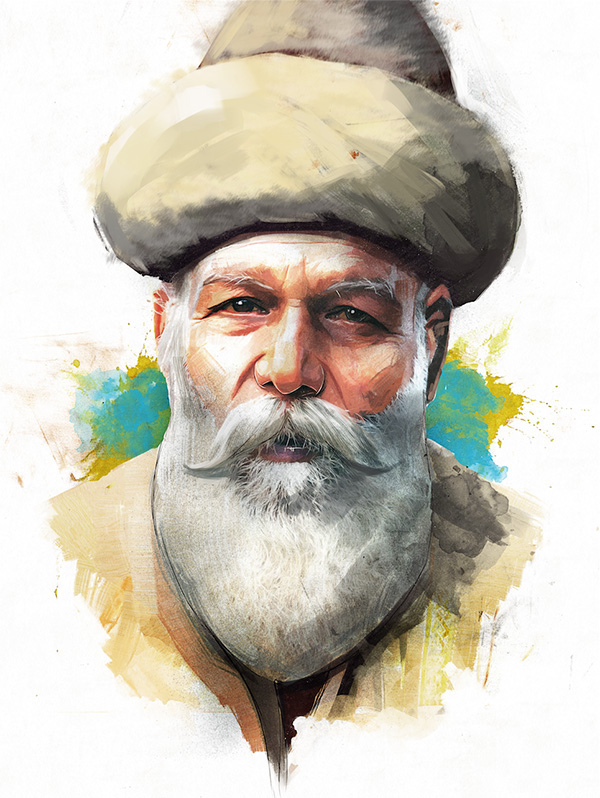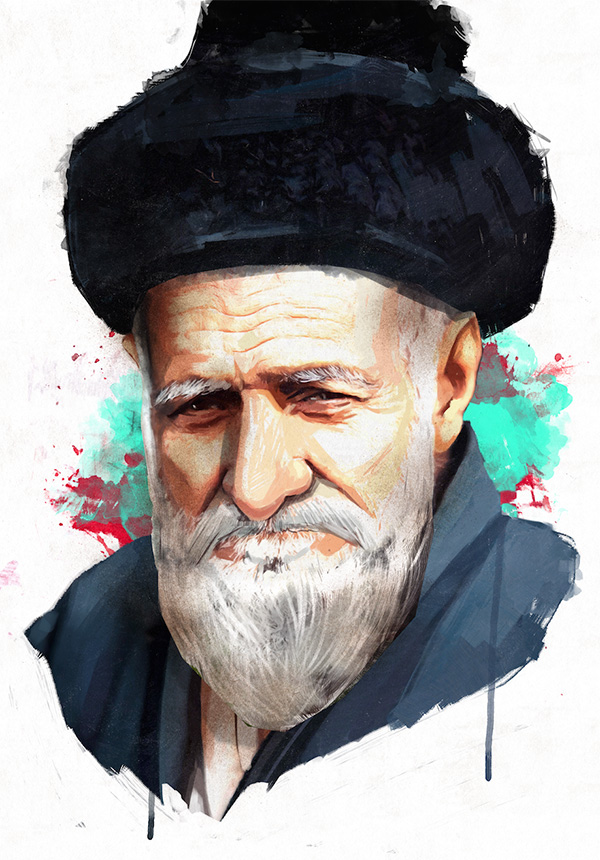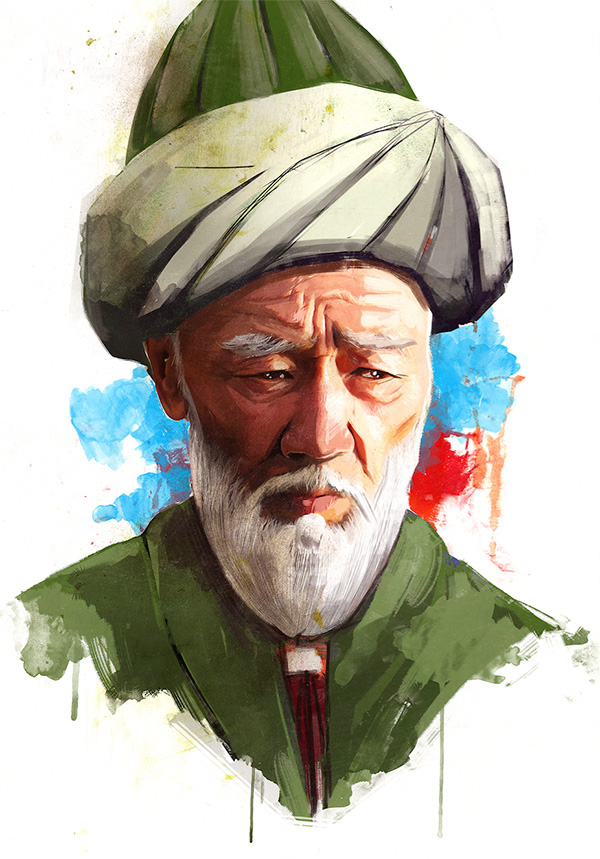- Scholars of the Turkish World -
___

Mevlânâ Celâleddîn-i Rûmî
Jalāl ad-Dīn Muhammad Rūmī (Persian: جلالالدین محمد رومی), also known as Jalāl ad-Dīn Muhammad Balkhī (جلالالدین محمد بلخى), Mawlānā/Mevlânâ (مولانا, "our master"), Mevlevî/Mawlawī (مولوی, "my master"), and more popularly simply as Rumi (1207 – 17 December 1273), was a 13th-century Persian poet, jurist, Islamic scholar, theologian, and Sufi mystic. Rumi's influence transcends national borders and ethnic divisions: Iranians, Tajiks, Turks, Greeks, Pashtuns, other Central Asian Muslims, and the Muslims of South Asia have greatly appreciated his spiritual legacy for the past seven centuries. His poems have been widely translated into many of the world's languages and transposed into various formats. Rumi has been described as the "most popular poet" and the "best selling poet" in the United States.
Rumi's works are written mostly in Persian, but occasionally he also used Turkish, Arabic, and Greek, in his verse. His Mathnawī, composed in Konya, is considered one of the greatest poems of the Persian language. His works are widely read today in their original language across Greater Iran and the Persian-speaking world. Translations of his works are very popular, most notably in Turkey, Azerbaijan, the United States, and South Asia. His poetry has influenced Persian literature, but also Turkish, Ottoman Turkish, Azerbaijani, Punjabi, Hindi, and Urdu, as well as the literature of some other Turkic, Iranian, and Indo-Aryan languages including Chagatai, Pashto, and Bengali.
Jalāl ad-Dīn Muhammad Rūmī (Persian: جلالالدین محمد رومی), also known as Jalāl ad-Dīn Muhammad Balkhī (جلالالدین محمد بلخى), Mawlānā/Mevlânâ (مولانا, "our master"), Mevlevî/Mawlawī (مولوی, "my master"), and more popularly simply as Rumi (1207 – 17 December 1273), was a 13th-century Persian poet, jurist, Islamic scholar, theologian, and Sufi mystic. Rumi's influence transcends national borders and ethnic divisions: Iranians, Tajiks, Turks, Greeks, Pashtuns, other Central Asian Muslims, and the Muslims of South Asia have greatly appreciated his spiritual legacy for the past seven centuries. His poems have been widely translated into many of the world's languages and transposed into various formats. Rumi has been described as the "most popular poet" and the "best selling poet" in the United States.
Rumi's works are written mostly in Persian, but occasionally he also used Turkish, Arabic, and Greek, in his verse. His Mathnawī, composed in Konya, is considered one of the greatest poems of the Persian language. His works are widely read today in their original language across Greater Iran and the Persian-speaking world. Translations of his works are very popular, most notably in Turkey, Azerbaijan, the United States, and South Asia. His poetry has influenced Persian literature, but also Turkish, Ottoman Turkish, Azerbaijani, Punjabi, Hindi, and Urdu, as well as the literature of some other Turkic, Iranian, and Indo-Aryan languages including Chagatai, Pashto, and Bengali.

Yunus Emre
Yunus Emre (1238–1320) was a Turkish poet and Sufi mystic who greatly influenced Anatolian culture. Yunus means Jonah.

Buhurizade Mustafa Itri
Mustafa Itri, more commonly known as Buhurizade Mustafa Itri, or just simply Itri (1640 - 1712) was an Ottoman-Turkish musician, composer, singer and poet. With over a thousand works to his name, although only about forty of these have survived to this day, he is regarded as the master of Turkish classical music. In 2012, due to the 300th anniversary of Itri’s death, the UNESCO declared 2012 the "International Itri Year".

Nâbi
Yusuf Nabi (1642 – 10 April 1712) was a Turkish Divan poet in the court of Mehmet IV. He was famous for "his brilliant lyrics filled with popular sayings and critiques of the age and verses commemorating innumerable important occasions."
At the age of 24 Nabi left Şanlıurfa Province and came to Istanbul to study. Subsequently, around 1680, he settled in Aleppo (in modern Syria). But in 1704 when Baltacı Mehmet Pasha became the grand vizier, Nabi followed him to İstanbul where he lived the remainder of his days.
At the age of 24 Nabi left Şanlıurfa Province and came to Istanbul to study. Subsequently, around 1680, he settled in Aleppo (in modern Syria). But in 1704 when Baltacı Mehmet Pasha became the grand vizier, Nabi followed him to İstanbul where he lived the remainder of his days.

Timur
Timur (Persian: تیمور Timūr, Chagatai: Temür, Uzbek: Temur; 9 April 1336— 18 February 1405), historically known as Tamerlane (Persian: تيمور لنگ Timūr(-e) Lang, "Timur the Lame"), was a Turco-Mongol conqueror and the founder of the Timurid Empire in Persia and Central Asia. He was also the first ruler in the Timurid dynasty.
Born into the Barlas confederation in Transoxiana on 9 April 1336. Timur gained control of the western Chagatai Khanate by 1370. From that base, he led military campaigns across Western, South and Central Asia, Caucasus and southern Russia, and emerged as the most powerful ruler in the Muslim world after defeating the Mamluks of Egypt and Syria, the emerging Ottoman Empire and the declining Delhi Sultanate. From these conquests he founded the Timurid Empire, but this empire fragmented shortly after his death.
Born into the Barlas confederation in Transoxiana on 9 April 1336. Timur gained control of the western Chagatai Khanate by 1370. From that base, he led military campaigns across Western, South and Central Asia, Caucasus and southern Russia, and emerged as the most powerful ruler in the Muslim world after defeating the Mamluks of Egypt and Syria, the emerging Ottoman Empire and the declining Delhi Sultanate. From these conquests he founded the Timurid Empire, but this empire fragmented shortly after his death.

Al-Farabi
Al-Farabi (Arabic: ابو نصر محمد بن محمد الفارابي Abū Naṣr Muḥammad ibn Muḥammad Al Fārābī; for other recorded variants of his name see below), known in the West as Alpharabius (c. 872 in Fārāb – between 14 December, 950 and 12 January, 951 in Damascus), was a renowned philosopher and jurist who wrote in the fields of political philosophy, metaphysics, ethics and logic. He was also a scientist, cosmologist, mathematician and music scholar.
In Arabic philosophical tradition, he is known with the honorific "the Second Master", after Aristotle. He is credited with preserving the original Greek texts during the Middle Ages because of his commentaries and treatises, and influencing many prominent philosophers, like Avicenna and Maimonides. Through his works, he became well-known in the East as well as the West.
In Arabic philosophical tradition, he is known with the honorific "the Second Master", after Aristotle. He is credited with preserving the original Greek texts during the Middle Ages because of his commentaries and treatises, and influencing many prominent philosophers, like Avicenna and Maimonides. Through his works, he became well-known in the East as well as the West.

Haji Bektash Veli
Haji Bektash Veli or Ḥājī Baktāsh Walī (Turkish: Hacı Bektaş Veli) was an Alevi Muslim mystic, Sayyid, humanist and philosopher, who lived from 1209 to 1271. He lived and taught from approximately 1209 to 1271 in Anatolia. He is revered among Alevis for an Islamic understanding that is esoteric (spiritual), rational, progressive and humanistic. Alevi and Bektashi Muslims believe the path of Haji Bektash is the path of Ali ibn Abu Talib, since Ali was the source of Bektash's teachings. His original name was "Sayyeed Muhammad ibn Sayyeed Ebrāheem Ātā", was one of the figures who flourished in the Sultanate of Rum and had an important influence on the Turkoman nomads of Asia Minor. He is also referred to as the Sultan of Hearts and the Derwish of the Derwishes. Haji Bektash Veli was a descendant of the 7th Shi'a Imam Musa Kazim.

Sarı Saltuk
Sari Saltik (Turkish: Sarı Saltuk, Ottoman Turkish: صارى صالتق Ṣarı̊ Ṣaltı̊q, also referred as Sari Saltuk Baba or Dede) (died 1297/98) was a 13th-century semi-legendary Turkish dervish, venerated as a saint by the Bektashis in the Balkans and parts of Middle East.

Seyid Yahya Bakuvi
Seyid Yahya Bakuvi (Azerbaijani: Seyid Yəhya Bakuvi) – was an Azerbaijani scientist and philosopher of medieval ages.

Ahmed Yesevi
Khawaja Ahmad Yassawi or Ahmed Yesevi (Arabic: أحمد يسوي, Uzbek: Ahmad Yasaviy, Аҳмад Ясавий, ئەحمەد يەسەۋىي; Kazakh: Ахмет Ясауи, Axmet Yasawï, احمەت ياساۋئ; Turkmen: Ahmet Ýasawy, Ахмет Ясавы, آحمِت يَسَویٛ; Turkish: Ahmet Yesevi; born in Sayram in 1093, and died in 1166 in Turkestan City; both cities are now in Kazakhstan), was a Turkic poet and Sufi, an early mystic who exerted a powerful influence on the development of Sufi orders throughout the Turkic-speaking world. Yasavi is currently the earliest known Turkic poet who composed poetry in a Turkic dialect. Ahmed Yesevi was a pioneer of popular mysticism, founded the first Turkic Sufi order, the Yasawiyyaor Yeseviye, which very quickly spread over Turkic-speaking areas. He was an Hanafi scholar like his murshid, Yusuf Hamdani.

Yusuf Has Hacib
Yusuf Khass Hajib (Arabic: يوسف خاصّ حاجب; Yūsuf Khāṣṣ Ḥājib Balasağuni; Uyghur: يۈسۈپ خاس ھاجىپ; Kyrgyz: Жусуп Баласагын) was an 11th-century Turkic poet from the city of Balasaghun, the capital of the Karakhanid Empire in modern-day Kyrgyzstan. He wrote the Kutadgu Bilig and most of what is known about him comes from his own writings in this work.


